It`s unlikely that more than perhaps a few fanatics would argue that Christianity in England is anything other than a religion. Of course that observation would be ridiculed if it were applied to Ireland north and the republic of, Germany where the Christian Democratic Union of Germany has become the largest party after the weekend`s general election. I suppose The European Christian Political Movement is a European political party exclusively working on promoting Christian values and of course evangelical Christians are a major source of support for both Democrats and Republicans in America. The 2021 United Kingdom census recorded an irreligious population of 25.3 million or 37.8% in England. But rarely a month goes by without a report of some woke tribunal, organisation or employer becoming newsworthy by virtue of its decisions on whether certain actions inspired by religious belief are lawful or not.
Comments are usually moderated. However, I do not accept any legal responsibility for the content of any comment. If any comment seems submitted just to advertise a website it will not be published.
Tuesday, 25 February 2025
CHOICES AND POLITICS
It`s unlikely that more than perhaps a few fanatics would argue that Christianity in England is anything other than a religion. Of course that observation would be ridiculed if it were applied to Ireland north and the republic of, Germany where the Christian Democratic Union of Germany has become the largest party after the weekend`s general election. I suppose The European Christian Political Movement is a European political party exclusively working on promoting Christian values and of course evangelical Christians are a major source of support for both Democrats and Republicans in America. The 2021 United Kingdom census recorded an irreligious population of 25.3 million or 37.8% in England. But rarely a month goes by without a report of some woke tribunal, organisation or employer becoming newsworthy by virtue of its decisions on whether certain actions inspired by religious belief are lawful or not.
Wednesday, 19 February 2025
Tuesday, 18 February 2025
IS ANY MINISTRY MORE WOKE THAN THE MOJ?
I would suggest that most readers are aware of Donald Trump`s war on woke. I make no apology for my own opinion on such actions as not before time. I would also suggest that historically this country tends to follow the social trends in USA albeit with a year or three`s delay.
Does the ratio of the ethnicity of District Judges cf magistrates affect outcomes? I would venture to suggest it does not. The appointment of District Judges or more senior judiciary does not for obvious reasons have being local as a requirement and nobody in his/her right mind would suggest otherwise.
“Free Free Palestine. To the Israeli terrorist both in the United Kingdom, the United States and of course Israel, you can run, you can bomb but you cannot hide – justice will be coming for you.”
13. Magistrates in Post
In comparison to judges, a higher proportion of magistrates are female, or from an ethnic minority background.
Sex
Of the 14,576 magistrates in post across England and Wales as at 1 April 2024, 57% were female (five percentage points higher than in 2014). There was no strong variation amongst the regions, ranging from 54% to 61% (Figure 46).
Figure 46: Proportion of female magistrates by region, 1 April 2024
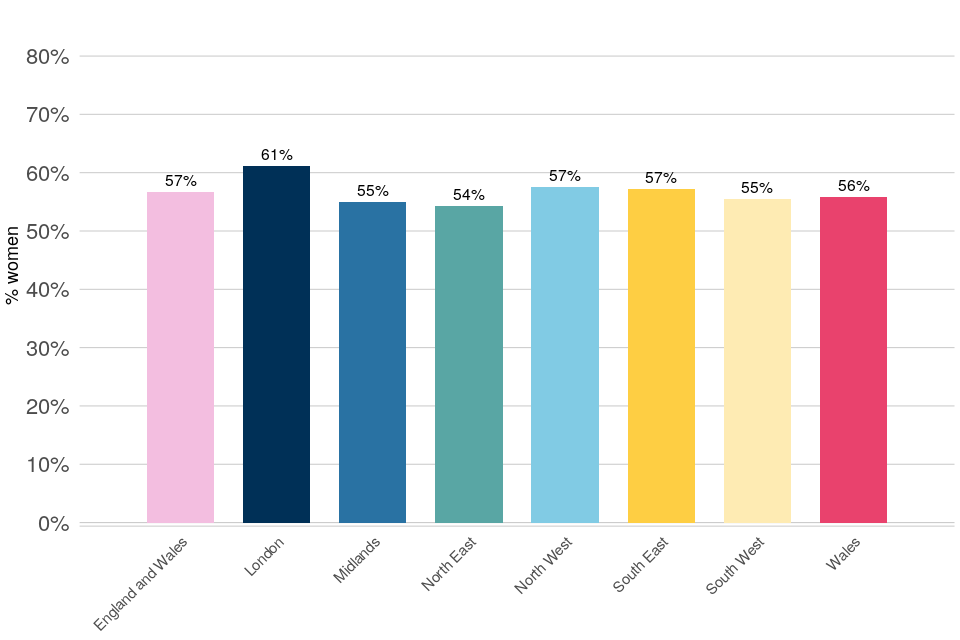
Ethnicity
As at 1 April 2024, ethnic minority individuals together constituted 13% of all magistrates (a five percentage-point increase from 2014 when 8% declared themselves as from an ethnic minority). More specifically for each ethnic minority group[footnote 46]:
- Asian or Asian British individuals constituted 7% of magistrates.
- Black or black British individuals constituted 4% of magistrates.
- Mixed ethnicity individuals constituted 2% of magistrates.
- Individuals from other ethnicities constituted 1% of magistrates.
These proportions showed some variation at a regional level, where London had at least double the proportion of Asian individuals compared to all but one of the regions, and at least treble the proportion of black individuals compared to all other regions (Figure 47).
Figure 47: Proportion of magistrates from each ethnic minority group by region, 1 April 2024
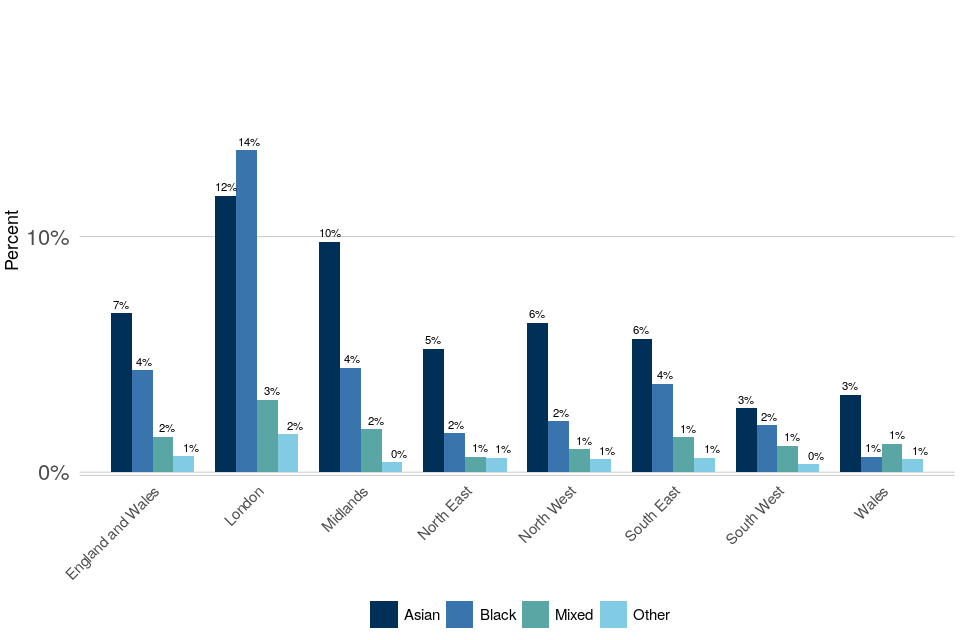
Intersection of Sex and Ethnicity
Table 3.7 shows that just under half (49%) of all magistrates as at 1 April 2024 were white and female. This was followed by the white male group with 38%, and then the ethnic minority female and ethnic minority male groups (8% and 5% respectively).
Age
Magistrates tended to be older than judges on average, with 81% of those in post being 50 and over.
13.1 Magistrates - leavers and new entrants
The proportion of magistrates that left during 2023/24 who were female (55%) or of an ethnic minority background (13%) were both slightly lower than the equivalent proportion of new entrants in 2023/24, at 58% and 15% respectively.
14. Magistrates Recruitment
On 17 January 2022, an updated magistrates’ recruitment process was launched. This update introduced a new applicant tracking system (ATS) which collects information on magistrate recruitment across England and Wales and includes more diversity data on applicants and recommendations for appointment to the magistracy.
This is the second year for which ATS magistrates’ recruitment data is being published[footnote 47]. Figures are now shown on the number of appointments of magistrates, rather than recommendations, with updated figures for 2022/23 given in Table 3.8a.
Beginning with this year’s report, figures are shown for the number of applications concluded on the ATS, made up of those not shortlisted, not appointed and appointed during the year. These will be in contrast to and not comparable with the number of applications started in the year.
The proportions of female individuals and ethnic minority individuals appointed to the magistracy are comparable to those already in post.
14.1 Applications
Table 3.8b shows that during 2023-24, there were 4,025 applications made to become a magistrate[footnote 48].
Sex
More than half (55%) of all magistrate applications submitted in 2023-24 were from female individuals, comparable to the 57% of magistrates already in post. There is some variation by region where the proportion of female candidates for the South East and South West are each below 50% (Figure 48).
Figure 48: Proportion of female magistrate applications submitted in 2023-24, by region
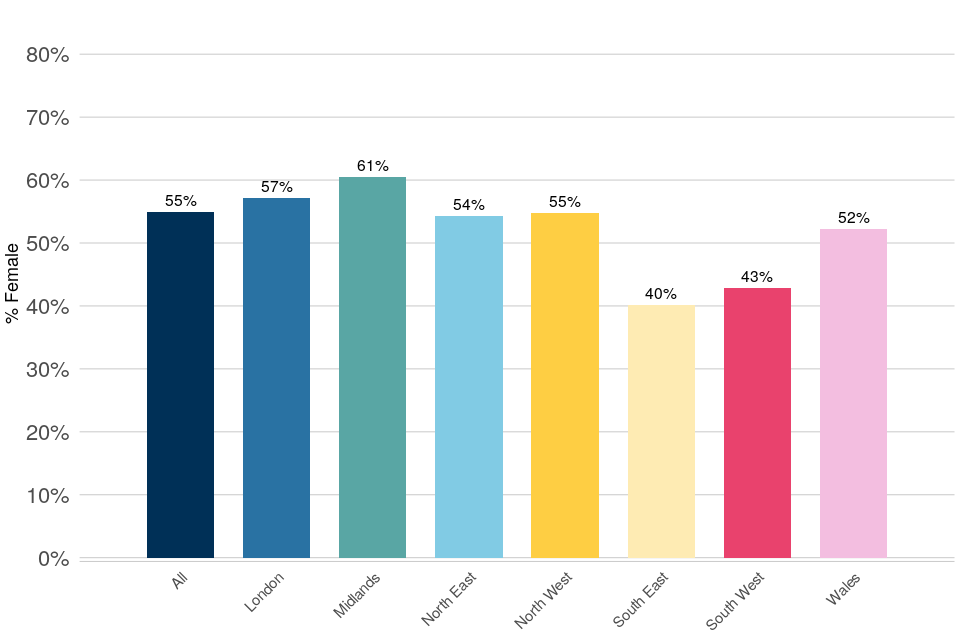
Ethnicity
In total, ethnic minority individuals constituted about 30% of all magistrate applications submitted in 2023-24, more than twice as high as the 13% of magistrates in post[footnote 49]. A wide variation in the proportion of ethnic minority applicants is seen at the regional level (Figure 49), from 9% in the South West and Wales to 51% in London. More specifically:
- Asian or Asian British individuals constituted 16% of applications.
- Black or Black British individuals constituted 9% of applications.
- Mixed ethnicity individuals constituted 4% of applications.
- Individuals from other ethnicity backgrounds constituted 2% of applications.
Figure 49: Representation of ethnic minorities among magistrate applications submitted in 2023-24, by region
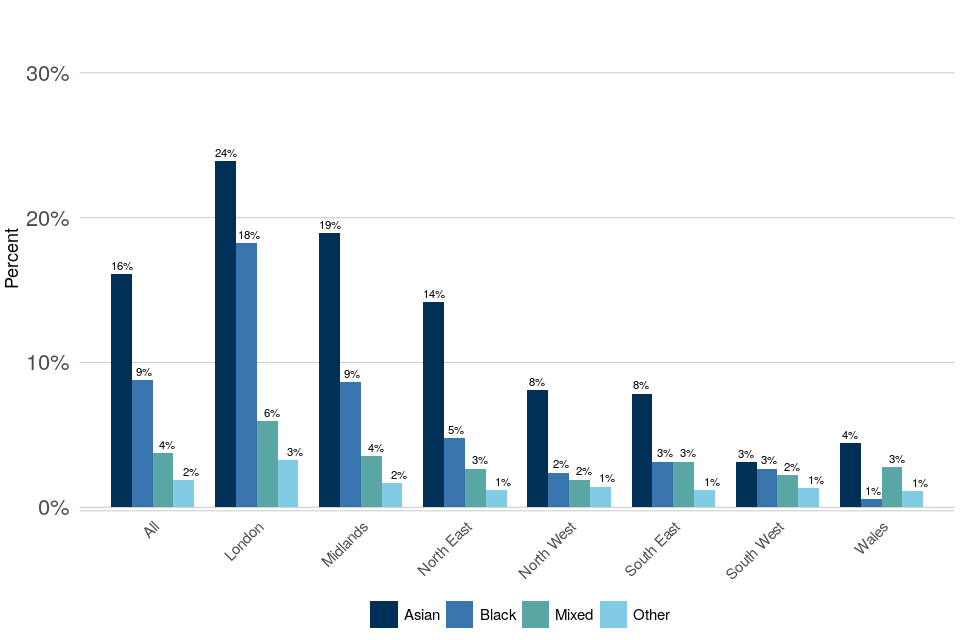
Age
On average, those who applied to the magistracy in 2023-24 were younger than magistrates currently in post. 53% of magistrate applications were from candidates aged 50 or over, compared to 81% of magistrates in post.
14.2 Appointments[footnote 50]
Table 3.8b shows that during 2023/24, 2,008 appointments to the magistracy were made in England and Wales[footnote 51].
Sex
Female individuals represented 58% of all magistrate appointments made in 2023-24. The female proportion of appointments by region ranged from 49% in the North West to 67% in London (Figure 50).
Figure 50: Proportion of female magistrate appointments made in 2023-24, by region
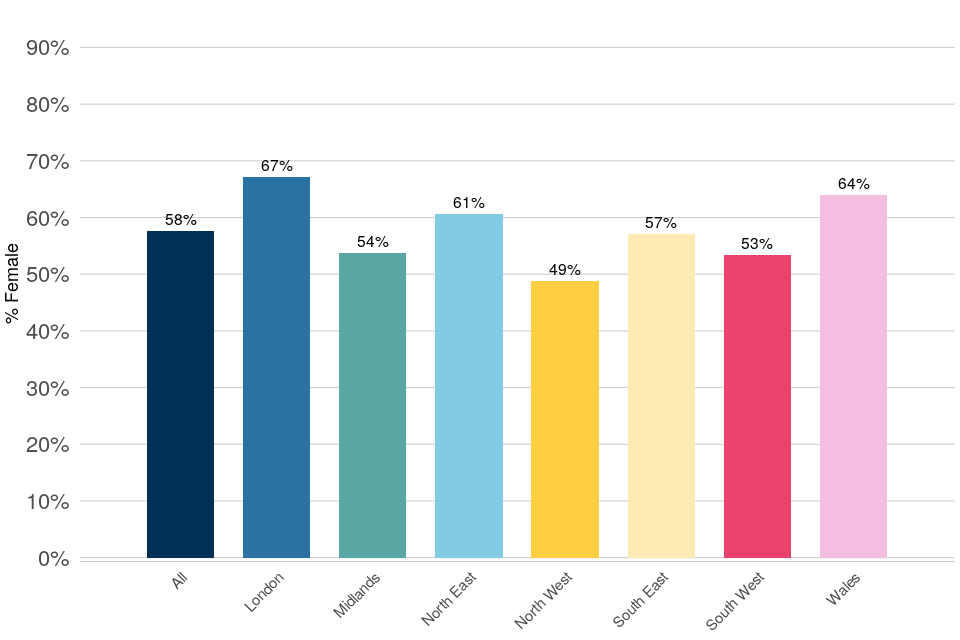
Ethnicity
In total, ethnic minority individuals constituted 16% of all magistrate appointments made in 2023-24. More specifically:
- Asian or Asian British individuals constituted 7% of recommendations.
- Black or black British individuals constituted 5% of recommendations.
- Mixed ethnicity individuals constituted 3% of recommendations.
- Individuals from other ethnicity backgrounds constituted 1% of recommendations.
By region, the proportion of those appointed who were from an ethnic minority background ranged from 8% for the South West and Wales, to 36% for London (Figure 51).
Figure 51: Representation of ethnic minorities among magistrate appointments made in 2023-24, by region
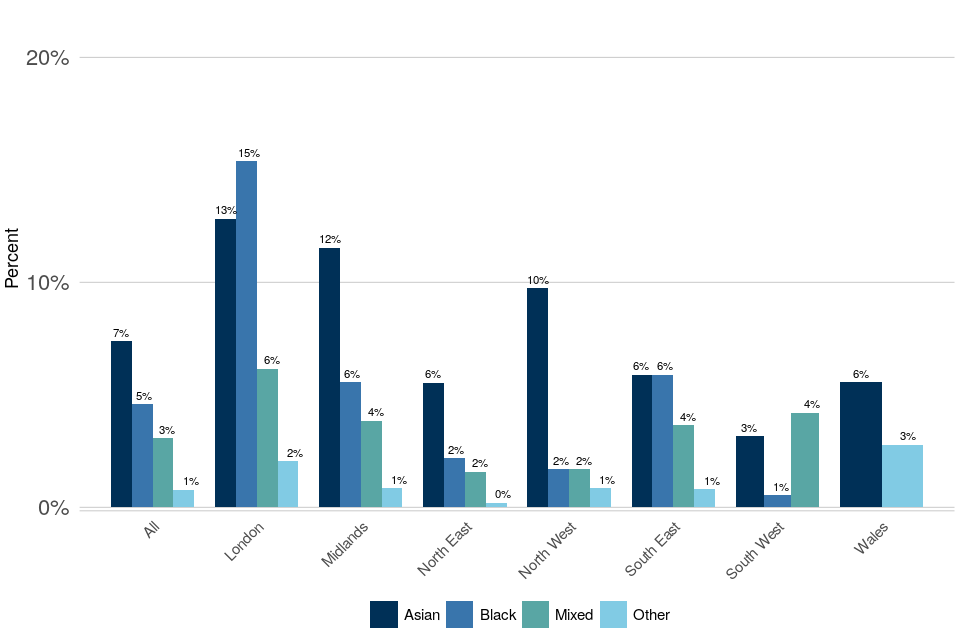
Age
Of all the magistrates appointed in 2023-24, 59% of them were aged 50 or over.
Monday, 17 February 2025
Wednesday, 12 February 2025
DO WE?????????
Tuesday, 11 February 2025
THE JCIO UNDER THE MICROSCOPE
The Judicial Conduct Investigations Office has been a topic here on more than one occasion. It oversees all quangos and government bodies authorised and controlled by the Ministry of Justice. Rarely are the professional judiciary the subject of disclosure within this authority although from time to time District Judges and tribunal members or coroners are called to account. Generally their failings have been on a procedural level rather than on the personal. More senior judiciary rarely appear on this site. Perhaps that is because they are so well trained and ensconced in their profession that personal or procedural errors are as rare as hens` teeth. There is of course a nagging doubt that within the elevated investigative process of possible misdemeanours of senior judiciary a behind closed doors form of retribution is involved. Be that as it may for 14,576 Justices of the Peace the buck stops at the JCIO recent decisions of which might lead to some raised eyebrows at its scope and consistency.
Wednesday, 5 February 2025
Tuesday, 4 February 2025
DO WE NEED LAY MAGISTRATES?
Failings of many public bodies have been filling air waves of broadcasting, pages of print and gigabytes of digital media for years. I would surmise that these failings have increased greatly this millenium although that opinion is possibly to have originated from whistleblowers and investigative journalists less likely to have been intimated by the authorities than in previous years. Indeed just last week Sir Julian Hartley the newly appointed chief executive of the Care Quality Commission admitted that the public could no longer trust safety ratings when choosing a care home for elderly relatives. The point I have posited previously is whether the failure of such bodies should be blamed upon the ineptitude of those who appoint the overseers.
When it comes to the constitution of magistrates courts about 10% of criminal cases are presided over by a professional District Judge the remainder by a bench of three Justices of the Peace. At the turn of the millenium there were about 300 courts, 30,000 magistrates and about 100 District Judges [MC]. Currently there are 150 magistrates courts and 14,576 magistrates an increase of 2,907 since the start of the Magistrate Attraction and Recruitment Campaign in January 2022 which is thought to have cost up to £2 million. Of the increase in numbers, 786 were re-appointments following changes to the Mandatory Retirement Age. There are around 300 District Judges a limited number of whom can earn up to £180,00 p/a although an average is £143,000. In 2023 District Judges and their deputies sat on 17.56% of cases at magistrates courts.
Lord Justice Auld's Review of the Criminal Courts {2001} indicated that that there could be a marginal reduction in costs if magistrates were superseded by DJs such margins increasing if legal advisors were also dismissed. Similar soundings are currently being undertaken at Petty France. But for the present, in 2023 there were 1.37 million cases undertaken at magistrates courts and at 30/9/2024 there were 327,228 cases outstanding. Since 18th November last year magistrates have had the power to sentence up to 12 months custody for a single offence. With such an onerous responsibility how can we be certain that those on the bench are competent for the task? During my 17 years on that bench, the majority as a presiding magistrate, I was appraised twice; once as a winger during a sitting by a presiding magistrate colleague of my own bench and once from the well of the court by a presiding magistrate from another bench as I was active in the middle chair for a full sitting. There was another occasion when three well dressed middle aged men sitting at the back of the court over which I was presiding spent a whole sitting taking copious notes the whole time. Who they were or for what purpose I knew not then and am non the wiser now.
For the Judicial College Activities Report Summary of expenditure 2022-2023 £19 million was the total allocated for judicial training. There is not a single sentence on what was allocated to the continuous training of magistrates. Current figures are unavailable but ten years ago a Freedom of Information request provided the following:-











